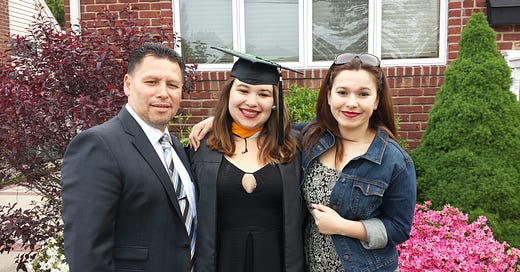Leaving Machismo Behind: Watching My Dad Become a Supportive Feminist
For most of my young life, I was surrounded by strong, independent Latina women who did what they wanted and didn’t let men get in their way of that. So was my father.
Rene Perez grew up in a home with a single mother, who moved all of her nine children to the States from Puerto Rico by herself. He and his three brothers were outnumbered by his five sisters. He was outnumbered when he married my mom and had two daughters and adopted a female dog.
Whether he realizes it or not, my dad has been influenced by so many strong women in his life. That’s what makes him such a great dad.
My childhood was a little bit different from other children’s because my mother has Multiple Sclerosis (MS). Fortunately, the disease didn’t really make much of an impact until I hit my teens and I have some great childhood memories with my mom. But the one thing I remember is how hard both of my parents worked to achieve their goal of moving out of their tiny apartment in Brooklyn to become homeowners. My mom would leave for work at five in the morning to her job as a cardiac technician, which left my dad the duty of getting us ready for school.
My dad never missed a beat during our morning routine. He woke us up, made sure our teeth were scrubbed (and he checked), made us make our beds, cooked us breakfast and made sure our school uniforms were spotless and wrinkle-free. He would also do our hair, which is something that I still admire about him to this day. He only knew how to do a ponytail or would brush out our hair to fit under a hairband, but our hair always looked good. At a young age, Papa Perez taught his two daughters the meaning of self-care.
When I hit my teens, my dad was working a lot more since my mom retired early due to her MS. But every time I needed a parent to do something for me, my dad would always find a way to get it done. Even in situations where I needed my mom for things like shopping, getting my nails or hair done, my dad was ready and willing to drive me to these appointments, moving around deadlines and appointments at work just to make sure my sister and I were taken care of.
I love my dad, but like all fathers, he has his flaws and I’ve seen glimpses of when the machismo comes out. Machismo, which is an internal code for men to act tough, is something many Latino men struggle with. My mother, sister and I have called him out many times when he chooses to not show his emotions properly. But as we’ve all got older, and as he’s become more of a caretaker to my mom, he’s shown us (and I hope himself), how much of a feminist icon he really is.
He pushed me to become a journalist too. When I first started working in the field as a breaking news reporter, I felt a lot of pressure from my male editors to produce an unattainable amount of work at a speed I had never done before. He told me to stand my ground, do my best work and to stand up for myself if I felt like I was being treated unfairly at work.
I’m really grateful I was raised by a feminist, Latino father.




